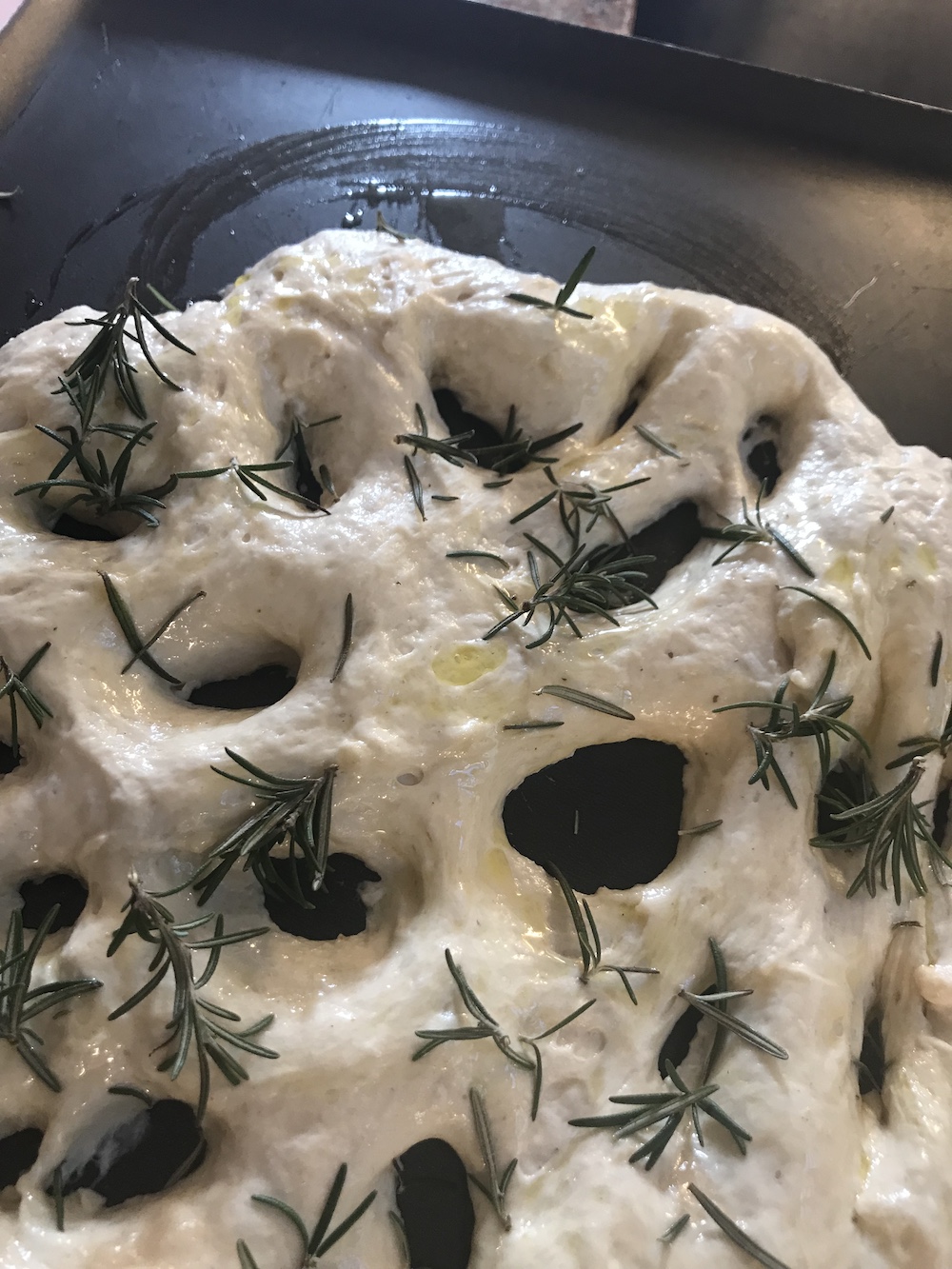
I would have formed the focaccia for mama but…well…you know…paws….
Well, we love bread around here. And we are very sorry for those who cannot have bread, but now there are some substitutes that are quite nice and have no gluten. Today we are thankful for bread and that we can share it with friends, family and on occasion, strangers!
AND…mama’s focaccia is simple: water, flour, yeast and salt, easy peasy, and we never lack for a “little shoe”, as a mop-up piece of bread is called in Italy, to clean up our pasta sauces or soups or use for that little last bit of cheddar, desperate to be finished off, haha. Mama would like to make another faster and more fun video but the cameraman is really busy right now. It will happen.
Here’s the recipe for no-knead focaccia or pizza dough or bread sticks or…just a tweak of the basic mix can give you lots of different breads.
FOCACCIA: BASIC DOUGH FOR LOAVES, ROLLS, OR FLATBREADS from No Need To Knead, Handmade Italian Breads In 90 Minutes (Hyperion)
Yield: For loaves: 1 large or small loaves
For focaccia: 1 large or 2 small focacce
For dinner rolls: 9 or 12
This user-friendly dough is about as basic as you can get. It was the dough that inspired me to start my bakery in Los Angeles and was the dough that everyone seems to like. One morning at the Farmer’s Market in Santa Monica, when I was setting up my bread concession, I dropped a focaccetta (sandwich sized) in the street and watched with horror (as did several others) as a pickup truck, Mercedes, and large van rolled over the just-baked loaf. We could actually see its shape spring back, resilient and just as fresh as ever, much like the Samsonite luggage which, dropped from 30 stories, bounces back without a scratch! This is very hardy dough.
With it you can make loaves of bread, flat breads, crisp breads, little rolls (focaccette), the French ladder bread fougasse, exotic hamburger buns, breadsticks, and more. You can also forget it in the refrigerator or leave it to rise a little too long and it will bounce back very easily with very little help-like a good sailboat in a storm, it is very forgiving. I have witnesses to prove it.
2 cups lukewarm water
2 teaspoons active dry yeast
4 cups unbleached bread flour
2 teaspoons salt
2 to 3 teaspoons olive oil
2 tablespoons chopped fresh rosemary
1 teaspoon kosher or sea salt
Measure the water into a large bowl. Sprinkle the yeast over the water and stir until dissolved. Stir in 2 cups of the flour and the salt and stir briskly until smooth, about 2 minutes. With a strong wooden spoon or one of those rare mixing spoons with a big hole in the middle, stir in the remaining 2 cups of flour for about 2 minutes longer, just until the dough pulls away from the sides of the bowl and the flour is incorporated. The dough will be fairly wet and tacky (sticky), but when it pulls away from the sides of the bowl and forms a loose ball, you’ll know the dough has been stirred sufficiently.
Same Day Method: Cover the bowl with plastic wrap and let the dough rise in a warm place until doubled in volume, 30 to 40 minutes. Proceed with the shaping instructions.
Overnight Method: Cover the bowl and refrigerate overnight. The dough will rise in the refrigerator and acquire flavor from the slower yeast action. Remove the dough 2 hours before shaping and let stand, covered, in a warm place. The dough will rise for the second time. Proceed with the shaping instructions.
For Loaf/Loaves
To shape: Follow the instructions for either the Same Day or the Overnight Method. Place one rack in the middle of the oven. Preheat the oven to 500 degrees F. Oil 1one seasoned non-stick, ovenproof 9-inch skillet or two 56-inch skillets.
Pour the dough into the large pan or divide it between the 2 smaller pans by loosening the dough with a spatula and then carefully scraping it from the sides of the bowl, keeping the dough as inflated as possible. With the spatula, cut the dough off at the edge of the bowl as it falls into the pan. The shape that the dough takes on as it falls into the pan is fine. Brush the tops of loaf/loaves with olive oil, sprinkle with rosemary and sea salt and set aside to rise until doubled, about 15 to 20 minutes.
To bake loaf/loaves: Place the bread in the preheated oven on the middle rack and reduce the oven temperature to 400 degrees F. Bake for 30 to 35 minutes for the 9-inch loaf and 25 to 30 minutes for the 6-inch loaves, or until nicely browned and bread sounds hollow when tapped with your finger. Remove loaf/loaves from pan and cool on a rack.
For Focaccia
To shape: Follow the instructions for the Same Day Method. Preheat the oven to 500°
F. Oil one 17x13x1-inch non-stick baking sheet pan for large focaccia or two baking sheet pans if making two small focacce.
Pour the dough onto the sheet(s), carefully scraping it from the sides of the bowl with a rubber spatula. Brush the dough with 2 teaspoons of olive oil. To make the traditional focaccia with indentations, dip your fingers into cold water and insert them straight down into the dough. Make holes in the dough by pulling it to the sides about 1 inch at a time. Pull the holes at random to form little craters all over with the pan showing through where you have put your fingers. As you work, stretch the dough into a 1-inch thick oval. (If you are using just 1 baking sheet, the focaccia will cover almost the entire sheet.) Brush the loaf with another teaspoon of olive oil and sprinkle with the rosemary and sea salt. Focaccia does not need to rise, but if you forget it for a few minutes, don’t worry. It will bake beautifully despite a little neglect.
To bake focaccia: Place the focaccia in the oven and reduce the oven temperature to 450° F. Bake for 15 to 20 [Note: I needed 20 to 25] minutes, until the focaccia has a nice, golden brown color mixed with a little darker brown around the indented area. [Note: See testing notes below.] Cool in the pan on a wire rack. Cut focaccia into wedges or rectangles and serve warm.
For Dinner Rolls
To shape : This is the easiest way to make rolls with any dough. Follow the instructions for the Overnight Method. Preheat the oven to 500°F. Generously spray a 3-section, seasoned French bread pan with non-stick spray or rub with olive oil. A 3-section pan will yield 9 or 12 rolls, depending on the size of dough you choose to cut off.
Take a good handful of the chilled dough (using about a third of the dough) and gently stretch it out into a rectangle approximately 2 inches wide and 8 inches long. For 9 rolls, Ssnip off about 2 1/2-inch pieces of dough and drop them into the grooves in the pan, using 3 to a groove. For 12 smaller rolls, snip off 2-inch pieces of dough, using 4 to a groove. You may shape them after cutting if you like, but I prefer the free-form look of the unshaped rolls. Brush with olive oil and sprinkle with fresh rosemary Let rise until doubled in volume. (If you wish to make rolls from room-temperature dough, pour the dough into the grooves of the pan, cutting off the dough with a scraper after a 3-inch of dough has “fallen” into the groove. Proceed again down the groove, letting the dough fall into its roll shape; (see illustration). Rolls made like this need only to rise for about 15 minutes before baking. They will have a good spring and be very tender with crisp crust.
To bake rolls: Place the pan in the oven on the middle shelf and reduce the oven temperature to 450° F. Bake the rolls for 12 to 15 minutes, or until golden brown on top. Cool in the pan on a wire rack for about 10 minutes, then transfer the rolls from the pan onto the rack. Serve warm.
Baker’s note: For a breakfast focaccia, mix 1 teaspoon cinnamon with 1 cup coarse brown sugar and sprinkle over focaccia in place of rosemary.


Focaccia with big holes














Mmmmmm! If we can ever remodel the kitchen and have a full sized working oven again, I’d love to try baking bread.
Hey, when it’s hot outside you can bake in a metal thingy…mama will look that up for you.
The Lady says this bread looks yummy and even though she’s not much of a baker, she may give this a try. ~Murphy
Well, mama would LOVE to know the outcome. Just don’t offer to make the holes that you stretch, Murph….
What a TREAT! Thanks for the recipe….!
Hugs, Teddy and Mom Pam
Oh, so glad and mama really wants to hear if anyone does it!
That sounds delicious and an easy recipe to follow. I will definitely be making this, but first need to get some more dry active yeast. I have everything else but knew the yeast was low and forgot to add it to my order at the time and now when I want it I don’t have it.!
Hey, you’ll eventually get a rise out of this, haha.
Those all look yummy, Loulou! Thanks to your mama for the recipes.
Mama says de rien and it’s a pleasure to have such enthusiasm for her focaccia. We love it, even I got a tiny bit.
Thanks so much for this yummy recipe…and its so versatile, too!
Our son is the bread baker here…LOL!! I am the quick bread lady, tee-hee!
Maybe I will try this for or festive meals during the holidays.
WOULD LOVE to have your son try this. Just remember one thing: DO NOT PUSH THE DOWGH DOWN after it has risen for the focaccia. It needs the airy texture.
Thank you and Mama for sharing !
You are so welcome, Ms Mary. Just would love to hear about results.
I have your mama’s No Need to Knead and I l0ve it. XO
OH, that’s the place to have fun, that’s for sure. So glad you like it!
Wow! That looks like something even I could do and the results look delicious! Thank you!!!!!!
I know you can do it, it’s such fun and even little kids that mama taught had fun doing it.